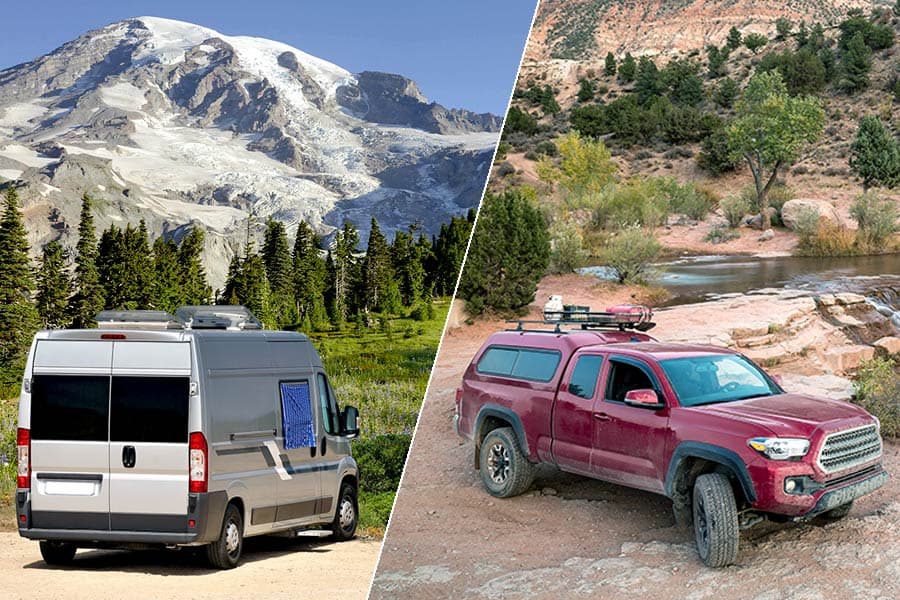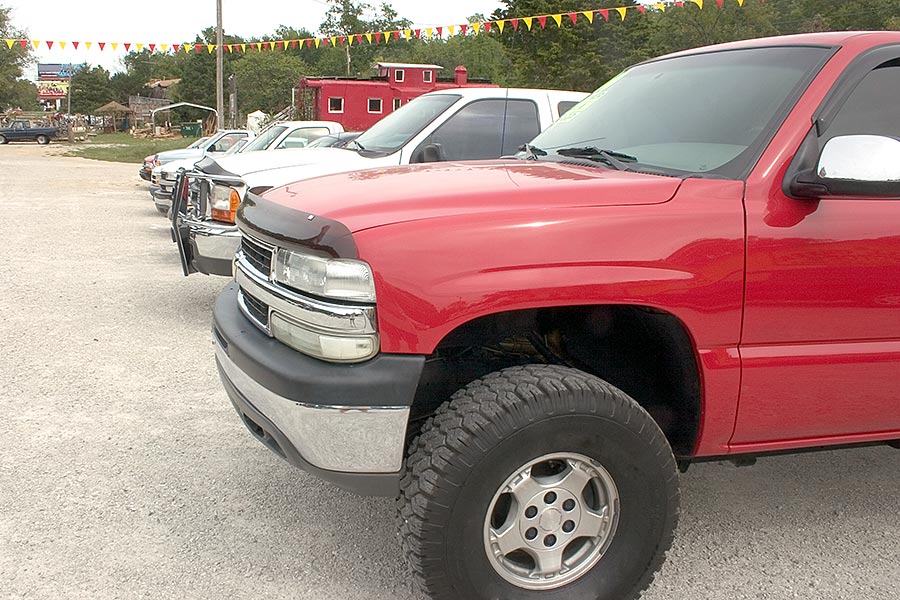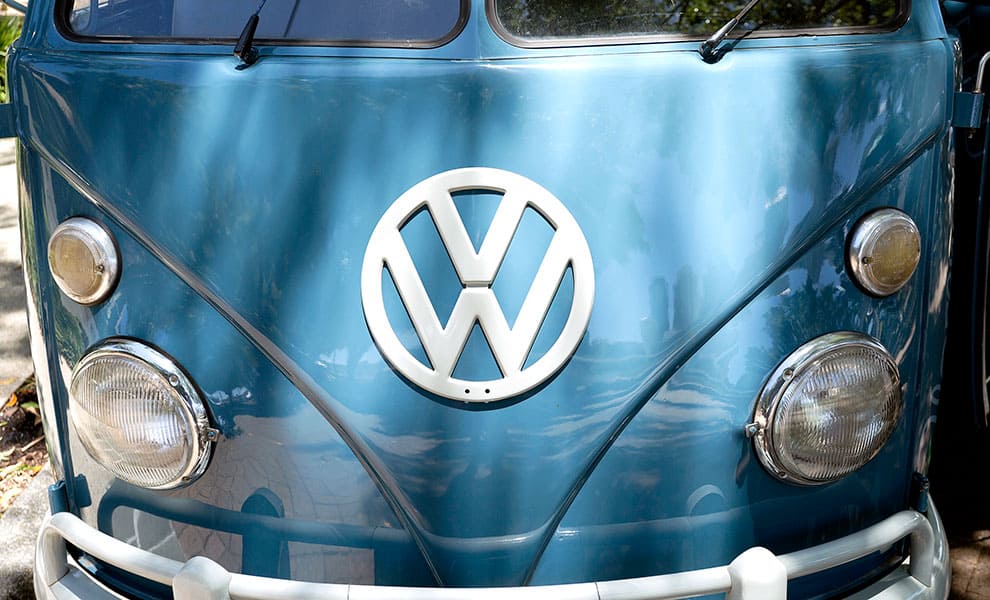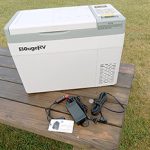
Truck camping and van camping are both great methods to have a mobile setup on wheels. You don’t need a tent or a backpack if you have your amenities all inside of a vehicle. However, they’re both very similar styles of camping.
So, what’s the difference between van camping and truck camping? Van camping usually involves a cargo van or a passenger van. In contrast, you do truck camping out of the back of a pickup truck.
To compare the two, we should first define what van camping is, followed by the details of truck camping. Without further delay, let’s review them separately.
Van Camping
Van camping is when you use a van as your camping shelter of choice. In most cases, you’d use either a cargo van or a passenger van, though minivans have made their way onto the scene as well. Using a van as a starting point, you can add beds, cupboards, solar-powered equipment, and more.
There aren’t very many limits to van camping. You can camp at most places that allow cars and RVs, but some people even go as far as sleeping in a Walmart parking lot. It might not sound glamorous, but on long road trips, it’s always nice to be able to park and catch a few hours of sleep wherever you can.
Van camping was very popular during the ’60s and ’70s, but it’s made a comeback within the last few years. The combination of comfortable camping and countless amenities packed into a mobile shell is simply perfect. You’ll also save tens of thousands of dollars compared to buying an RV!
Another reason that vans are so favorable in the camping world is that you don’t need a special license, nor will you be limited with parking restrictions. Finding a spot to park a 35-foot Class A RV is a challenge. Vans are only about 18 to 21 feet, which makes them easier to maneuver and park.
Perhaps one of the main reasons that so many people love van camping is that you get to design everything as you’d like. Everything is already laid out in an RV, but a van is a blank canvas for your own creativity. Put the bed wherever you’d like, make a colorful tiled floor, or line the roof with tapestries.
We have a post “What is Van Camping?” that delves into van camping further.
Truck Camping
Truck camping is very similar to van camping, but there are a few twists. The appeal of camping out of a truck is that they’re much more common than vans.
If you have a truck, all you need is a camper shell, and you can make a quick camping setup. The shells run anywhere between $1,000 and $2,500 brand new depending on the size, company, and features.
Although you might not have as much room in a truck bed as you would in a van, there’s still plenty of space to work with. The key component to buying the right truck is to make sure that the bed is long enough for you to stretch out. If you’re 6′ tall, you should get a truck with a bed around 6’6″ to 7′.
Truck camping is much more appreciated by those who enjoy simple camping. Pop down the tailgate, set up a camping stove on top, and you’ll be relaxing in the woods without anything too complicated. It’s also nice because you can quickly remove all of your camping supplies if you have to use the truck for something else.
Many trucks come with off-road capabilities. All you need are four off-road tires, and you’ll be able to drive down dirt roads, snow-covered streets, and gravel pathways that might otherwise limit van drivers without 4-wheel drive. They’re also a bit easier to handle if you’re not used to heavier vehicles.
Speaking of comparisons, now it’s time to find out which of the two camping styles is best for you.
The Pros And Cons Of Van Camping vs. Truck Camping
Truck camping and van camping are both a whole lot of fun. You get to enjoy the outdoors from a mobile home that you created to match your vision. However, there are certainly pros and cons to both types of camping.
Below, you’ll find why many people prefer one over the other.
Pros of Van Camping
- Van camping offers a wider, taller space than truck camping. Even if you have a low-top van, you’ll have quite a bit more room to stretch out and use. There are all sorts of possibilities, including an extra-long bed, a kitchen sink, and a refrigerator.
- If you’re camping with someone else, van camping is the way to go. The bed size can be big enough for two people, unlike a truck that only has enough room for a narrow bed if you want room for anything else.
- Vans are designed to carry heavy loads. You’ll have a much better fuel efficiency ratio when you’re driving a loaded van than you would if you had a loaded truck. Not to mention the fact that you wouldn’t have to worry about damaging the chassis or tires from putting too much weight on it.
Cons of Van Camping
- Vans can get a bit expensive. The resale value on a used van helps, but you’ll still be spending quite a bit of money if you want a high-top cargo van. The repairs are equally as costly.
- You’re going to have a much harder time finding a good van to use as a camper than you would a truck. Trucks are everywhere; vans are limited to commercial jobs for the most part. Even if you do find a used van, you’ll be lucky to find one with less than 100,000 miles.
- Vans are much bulkier than trucks. Getting into a tight parking space, under a low-hanging garage entrance, or going through a fast-food drive-thru is not an easy task if you’re not used to it.
Pros of Truck Camping
- Trucks are easy to find. You can drive to almost any auto dealership and find trucks of all sizes, makes, and models for a reasonable price. Many third-party seller websites also have people who sell trucks every day.
- When you’re not using a truck to camp, you can throw other items in the bed. To do this in a van, you’d have to spend hours removing everything just for decent cargo space.
- Trucks don’t draw as much attention. If you’re parking a truck somewhere in a parking lot to sleep for a little bit, nobody will notice. Vans are quite obvious in most cases.
Cons of Truck Camping
- In a van, you can walk from the bed to the driver’s seat right away. In a truck, you have to exit through the back and walk around to access the driver’s seat. Not only is it inconvenient, but it’s also not ideal for emergencies.
- Since truck beds aren’t as low and stable as vans, they tend to wobble a bit. Every little movement when you’re lying down in bed will move the truck for a few seconds at a time.
- There’s not nearly the space in the back of a truck as there is in a cargo van. You won’t be able to stand, regardless of which camper shell you get. You’ll also have minimal space to install refrigerators, roof ventilation fans, cupboards, and so on.
Other Posts of Interest
- The 7 Best Screens For Van Camping – And How To Set Them Up
- Can You Carry A Knife While Camping? The Law Explained
- How To Choose a Camping Flashlight: A Complete Buyer’s Guide
What Is The Price Difference Between Van Camping And Truck Camping?
If you’re still not able to choose which one is right for you, then you’re probably curious about the price differential. There are a few factors to take into consideration when you’re buying a vehicle to use for camping.
For example, you can spend less money if you buy a used vehicle versus a new one. If you find a used vehicle in excellent shape, you could be getting a new-quality vehicle at a steep discount – so keep your eyes peeled!
Here are a few other factors that could determine the price difference:
- New vans and new trucks cost close to the same amount. That being said, used vans usually don’t go on the market until they’ve surpassed 100,000 miles. You’ll still pay around $10,000 to $15,000 compared to a used truck of the same mileage that would be approximately $7,000 to $12,000.
- Keep in mind that you’ll have to add the price of the truck’s camper shell to the total cost. New shells run around $1,000 to $2,500, but you can find used shells as low as $400 or less, which is a good deal.
- What type of amenities do you want to add to it? You can spend under $500 to convert a truck bed into a camping space fully. For vans, you’ll need around $1,000 or more to have everything filled out. Add solar power to your van with this easy-to-use kit, a refrigerator, and some cabinets, and you can quickly eclipse $5,000 for a full van conversion.
- Always remember repair costs when you’re buying a used vehicle. New vehicles have fewer repairs, but they tend to cost more for the parts. Both the make and model of your vehicle also directly impact the repair prices.
As you can see, the price difference can vary dramatically. If you’re the type of camper who doesn’t need much to enjoy a good time, then you can spend very little money. On the other hand, some people spend up to $70,000 or more to convert their vehicles fully.
It’s safe to say that the average van conversion, including the van itself, costs about $10,000 to $20,000 for a used vehicle and $50,000 to $70,000 for a new vehicle. You can spend more or less, depending on the variables listed above.
Truck camping generally costs about $4,000 to $12,000 for used vehicles and $30,000 to $50,000 for new vehicle conversions. Again, refer to the previous list to find out where you can save money right away.

What’s The Best Make And Model For Truck Camping?
When you’re camping out of a truck, there are all sorts of options. Dodge, Ford, Chevy, and a couple of other brands make top-notch vehicles for camping. The main feature that you need to look for is the length of the truck bed. The width is important, but not quite as important as the length.
People have been using their trucks to camp for many years. You can search by finding your favorite make and model, but a few are certainly much easier to outfit. Here are the top options for truck camping:
Dodge Ram. This truck can carry much more than almost any other vehicle on the market. If you’re going to be taking a lot of gear to camp with, then you might not find a better choice.
Ford F-150. The F-150 is one of the most popular trucks in the USA. They’re very durable, so you don’t have to worry about scratching or scuffing the truck bed when you’re moving your camping gear around. There are also quite a few camper shell options for Ford trucks.
Toyota Tacoma. If you’re looking for a lightweight truck that’ll run far past the competition, this is your best bet. Tacoma’s have much smaller beds, so you should only use one for camping if you’re around 5’9″ or shorter.
As you can see, there are more than enough choices to look into for camping. Chevy, Honda and Nissan all make trucks as well that are worth trying out. It all depends on what you want to use it for and whether or not you will only be using your truck for camping.
What’s The Best Make And Model For Van Camping?
Van camping has a few options as well, though you should be a bit more careful when choosing a van.
If you can get any make/model under 100,000 miles, you shouldn’t have any issues. Unfortunately, used vans are sometimes used hard by small businesses, meaning you’ll probably have a few repairs going forward. However, some companies rotate their vans regularly, so you might be able to find one with lower miles.
Here are four vans that work great for camping:
Ford Transit. The Ford Transit is another excellent choice for a camper van. They come in three different lengths and offer a choice of a low, medium or high roof. The high roof version gives you ample headspace when walking in the van and will provide you with more room to build much-needed storage space. Again, businesses use these vans frequently so they are usually easy to find used or new.
Ram ProMaster. If you’re looking for something tall and spacious to camp out of, there isn’t a better truck or van than the ProMaster. These vans have extra square footage from the rounded corners to the low-sitting floor. The price might be high for a ProMaster, but it’s well worth it if you’re going to be camping in it frequently.
Chevy Express Cargo Van. The Express is Chevy’s answer to the Ford E-Series. They both look very similar, and the interior space is about the same as well. Much like the E-Series, you’ll be able to find parts without a problem at almost any repair shop.
Ford E-Series. Whether you’re getting an E-150, E-250 or E-350, Ford makes some of the best vans to use for camping. The shell is tough, and it comes partially insulated already. You can also find parts for your E-Series van from almost any dealership since they often used the same components as the popular F-150.
While these four are undoubtedly top contenders, it would be wrong not to mention the classic vans. The Volkswagen buses are appealing to the eye, and they’re the exact vehicle that people used to go van camping many decades ago. You can also check out the classic Chevy vans from the ’80s and ’90s as well as the Ford E-100 from the ’70s.

Van Camping vs. Truck Camping: Which Is Better For You?
Both styles of camping offer incredible experiences, but only one of them is right for you.
If you’re someone who enjoys relaxed, comfortable camping without too much setting up to do, then truck camping is probably the way to go. Dropping the tailgate gives you the perfect table, and you already have a bed set up inside of the truck bed.
On the other hand, if you plan to make long road trips or you love camping with more amenities, then van camping is for you. You’ll also be able to stand up straight, which is something that truck camping simply can’t offer.
Overall, it boils down to personal preference. Both options give you the undeniably freeing possibility of camping on wheels without the bulky size and more difficult handling of an RV. The rest is up to you to decide.
Conclusion
Whichever type of mobile camping you choose, you’re bound to have a good time. The most important part is to make sure that you know what you’re getting yourself into.
Follow these quick summarizing tips to find your match:
- Choose a truck if you like simple solo camping.
- Choose a van if you prefer more space and amenities.
- Always make sure that you’ll have enough room to lie down and stretch out.
- Ford, Toyota, Chevy and Dodge make the best modern trucks and vans for camping.
- Consider the expenses of buying used vs. new.
- Van camping is a bit more expensive than truck camping in most cases.





